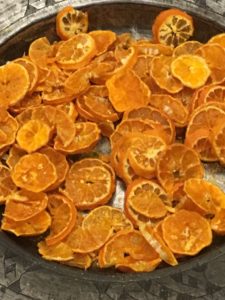21st January 2019 London,UK
Marmalade
One of the more unusual invitations I have received of late came from Jane Hasell-McCosh, Founder of the “World’s Original Marmalade Awards”, to a reception last week at the Japanese Embassy to launch the 14th edition of the awards.
It turned out that the awards have their spiritual, indeed physical, home in Dalemain Mansion, a country house near Penrith in Cumbria, which has been owned by the Hasell family since 1679. Starting out with a small group of enthusiastic local marmalade producers, the awards have now developed into a major event, supporting the Hospice at Home Carlisle and North Lakeland. The competition is open to all, and features a bewildering range of categories, from “any citrus marmalade” (any fruit you like, so long as it’s citrus) to “octogenarian and upwards” for the more mature marmalade maker. And of course there is a “Seville orange marmalade” category, for which the only permitted ingredients are Seville oranges, sugar, lemon juice and water. There are also artisan awards for small commercial producers, though they must make their marmalade using the traditional open pan method, as well as awards for the hotels and restaurants which make and serve the best marmalade.
But why the Japanese Embassy? The World’s Original Marmalade Awards has taken on an international dimension. The format was first exported to Australia, now home to its own Festival of Marmalade. UK/Australia marmalade rivalry finds expression in the “Marmalashes”, in which a team of elite Australian marmalades are sent to Dalemain to compete against their British counterparts. Australia won the 2018 edition, and so the court house in the town of Buninyong, Victoria State, is currently the proud custodian of the Marmalashes Trophy.
Japan is the latest addition to the marmalade awards family. Japanese entrants have been competing in the festival for several years, taking a coveted double gold award in 2018. The Japanese Ambassador has been among the visitors to the festival in Dalemain, and the Japanese city of Yawatahama, at the centre of a citrus-producing area of southwest Japan, has taken on the challenge of organising the first edition of the Dalemain World Marmalade Awards and Festival in Japan which will be held in May this year. The cheerful Mayor of Yawatahama was at the event, and fully signed up to the power of marmalade to connect cultures and people. “You can love people through marmalade”, he told the audience. Japanese artisan producers at the reception invited guests to sample their marmalades, made with intriguing fruits like “yuzu”, with a flavour somewhere between a grapefruit and a mandarin.

The reception also starred the children of the Stainton Church of England Primary School, who delivered a rendition of The Marmalade Song, a hymn of praise to “marmalade, tasty as can be.” They were insistent about the right accompaniment to your bread: “don’t put jam or honey, because marmalade is best.”
There was an impressive range of partner organisations at the event, from Fortnum and Mason, which puts some of the winning marmalades on sale in its stores, to the Worshipful Company of Fruiterers, which is developing training activities around the link with Japan, and the Royal Horticultural Society, with whom Dalemain is a partner garden.
If soft power is about the attractiveness of a country, then the Marmalade Awards enhance UK soft power, through the product itself, the glorious eccentricity with which it is being commemorated and the emphasis on connecting people around the world. This is citizen soft power, the product of individual passions, and not something governments can or should attempt to steer, though we can celebrate it.
Spread The Word!